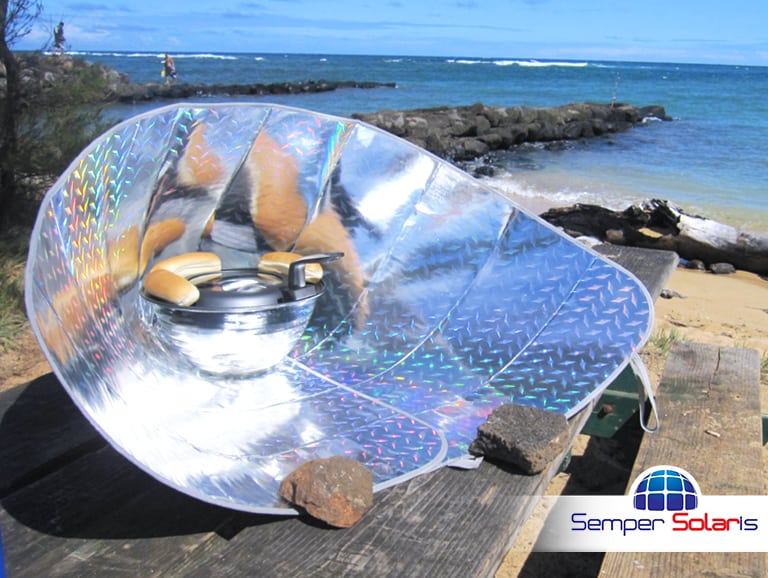Solar cookers are devices that use energy directly from sunlight to heat or cook food and drinks. There are many different styles of solar cookers that are currently in use and most are low cost, low tech devices. There are however some solar cookers that are extremely advanced and powerful and can cost as much as a traditional oven. Solar cookers are environmentally friendly as they do not use fuel or need electricity to operate. Because of this, many organizations promote the use of solar cookers to reduce air pollution and fuel costs as well as slowing deforestation caused by gathering wood for cooking. Solar cooking is often used in areas where the risk of fire accidents is high, or where the minimal consumption of fuel is important.
How Solar Cookers Work
Different types of solar cookers generally follow the same basic principles of operation but can vary slightly depending on the type of cooker in use. Typically, food for a solar cooker is prepared the same way as it would be for a traditional oven. It is recommended that food to be placed in a solar cooker be cut or broken into smaller pieces, allowing it to cook faster. For simple cooking, food can simply be placed in a bowl or on a tray, uncovered. If you are cooking several foods that need to be separated, then they are placed in several different containers. The container of food is then placed in the solar cooker. The solar cooker can be elevated on a metal trivet, rock, or brick, and should be placed directly in the sunlight. If the cooker is placed correctly, then the shadow of the cooker will not overlap with the shadow of any objects nearby.
Solar cookers are simply placed in direct sunlight and left to work until the food is finished cooking unlike cooking over a fire or on a stove which can require constant supervision. Generally, it is unnecessary to stir or turn food in a solar cooker as it can cause heat to escape which can increase cooking time. Cooking times can vary depending on the performance of the solar cooker in addition to local weather conditions.
Types of Solar Cookers
- Box Cookers - Box solar cookers have transparent tops made of either plastic or glass and can have added reflectors to help concentrate the sunlight. Box cooker tops can generally be taken off to allow containers of food to be placed inside. Shiny metal reflectors or foil can be positioned to help concentrate extra sunlight into the box. The food containers used with box cookers are dark in color and the box has insulated sides. If building a box cooker, thermal insulation should be used that can withstand high temperatures without melting. Box cookers will usually reach about 300 degrees Fahrenheit.
- Panel Cookers - Panel cookers are very inexpensive and have reflective panels that direct sunlight to a container of food that is placed in a clear, sealed plastic bag. This is the type of solar cooker that is often used in science experiments as it can easily be made at home with common household materials.
- Parabolic Cookers - Parabolic cookers work by concentrating the sun's rays to a single point that focuses on the bottom of the pot holding the food. Parabolic cookers can heat containers very quickly to temperatures comparable to those of charcoal and gas grills. Parabolix cookers are used in many areas of the world. In India and China, parabolic cookers are used for heating water and preparing food. It has been estimated that the use of parabolic solar cookers in China have abated between one and four tons of carbon monoxide per year since they started being widely used.
Advantages and Disadvantages of Solar Cookers
There are several advantages and disadvantages to using solar cookers to prepare food.
Advantages
- Parabolic solar cookers can make food within minutes.
- Box cookers can prepare most foods and sterilize water in a matter of hours.
- Solar cookers do not use fuel, making them an environmentally friendly option.
- Solar cookers are used outside, meaning that they do not contribute to heat inside which could possibly save on cooling costs and make for less cleanup.
- Solar cooking requires less hands-on time during the cooking process.
Disadvantages
- Solar cookers are not as useful when the weather is overcast or when the sun is low in the sky.
- Some solar cookers take much longer to cook food than it would with a traditional oven.
- It may be necessary to learn new techniques for cooking foods such as fried eggs.
- Certain solar cookers can be affected by wind, slowing down the cooking process and cooling the food.
More on Solar Cookers
Local Solar and Roofing Installation & Repair




